Building Understanding on the Links Between Faith, Climate and Conflict
Inclusivity | May 2023
The contribution of faith communities is instrumental in socially transitioning to climate neutrality and developing innovative solutions to combating the climate crisis.
On Monday, May 15, the Peacemakers Network hosted its second Inclusivity-based Community of Practice meeting of 2023, “Building Understanding on the Links Between Faith, Climate and Conflict.” This meeting focused on how members and supporters of the Inclusivity-based Community of Practice are working with faith communities to address climate-based conflicts. The Network’s Senior Specialist on Inclusive Peace, Jessica Roland, began the meeting by welcoming over 70 participants and providing an overview of the agenda. The discussion then turned to three guest presenters who highlighted their work at the global and local levels.
The first guest presenter was International Director for Faith for Our Planet, Shiraz Ahmed, who spoke about how Faith for Our Planet is building the capacity and awareness of faith actors to bridge science and faith on climate issues through theological training and scriptural reasoning to support ecological consciousness. Ahmed spoke about how faith actors can utilize their influence to raise awareness on the linkages between conflict and climate emergencies, mobilize their followers towards sustainable practices, advocate for climate action, and work with policymakers to address environmental inequalities and promote peace. Ahmed also highlighted the upcoming opportunities below on how others can get involved in future activities of Faith for Our Planet.
Faith for Our Planet Upcoming Opportunities
2023
Training Faith Leaders – Bangladesh, July
Evangelical Communities on Climate Action – USA, September
Side Event at UNGA – USA, September
Connecting Global North with Global South – Oslo, October
African Union Interfaith Week Training Workshop – November
Side Event at COP23 – UAE, November
Global Summit – Brussels, December
2024
Youth Fellowship at Duke University – USA, January
Training Workshop – Malaysia
Women of Faith Fellowship at Columbia University – USA
The second guest presenter was Marion Akiteng, Gender Focal Person for CECORE, who focused on the critical importance of localizing climate, peace and security issues. Akiteng spoke about CECORE’s work in Uganda and the importance of bringing awareness and educating local communities about the climate crisis. Akiteng also highlighted the need to recognize that local communities already have their own ways of understanding the impacts of climate emergencies and the need for the international community to document and learn from these ways of understanding.
Below are 5 steps recommended to help peacebuilders document climate security challenges from A Practical Step-by-Step Guide for Local Peacebuilding Actors. For more information on how to document, assess and address climate security challenges at the local level, check out the practical step-by-step guide for peacebuilding actors.
GPPAC. Localising Climate, Peace and Security: A Practical Step-by-Step Guide for Local Peacebuilder Actors. 2023. https://gppac.net/resources/localising-climate-peace-and-security-practical-step-step-guide-local-peacebuilders
The second guest presenter was Marion Akiteng, Gender Focal Person for CECORE, who focused on the critical importance of localizing climate, peace and security issues. Akiteng spoke about CECORE’s work in Uganda and the importance of bringing awareness and educating local communities about the climate crisis. Akiteng also highlighted the need to recognize that local communities already have their own ways of understanding the impacts of climate emergencies and the need for the international community to document and learn from these ways of understanding.
The third guest presenter was the General Secretary and CEO of Atisha Dipankar Peace Trust Foundation, Sanat Kumar Barua, who focused on the need for faith communities to be reconnected to nature through their shared values. Barua highlighted the work of the Interreligious Climate and Ecology (ICE) Network, which is a pan-Asia, local-to-local collaborative network, seeking to share experiences, learning and empowerment in the face of climate change. Barua specifically raised the ICE Network’s “Interfaith Climate Justice and Regeneration Training,” as a resource for faith communities to utilize to raise awareness about the cause of climate emergencies and to explore solutions while learning from each others’ experiences.
Climate change is a major global challenge that has far-reaching consequences for communities and nations across the world. It impacts natural resources including water, land, and food, which can trigger conflicts and increase the vulnerability of communities to environmental stressors.
The meeting then held a youth-focused fireside chat with moderator Mustapha Abdurrahman, Projects Coordinator for Building Blocks for Peace Foundation, and with speakers: Youssef Aroog, President of the Mediterranean Youth Foundation for Development; Emily Miki, Youth Fellow for Faith for Our Planet; and Brian Delos Santos, Youth Fellow for Faith for Our Planet.
Aroog began the conversation by raising the issue that there is a lack of trust between faith leaders and community members, including young people, notably around addressing the climate crisis due to faith-based climate deniers. To increase awareness and combat this issue, Aroog called for faith leaders to install eco-friendly practices within houses of worship to set the example for others and to create alliances and invest in relationships to lead the climate movement.
Miki then focused on the need to train more trainers on reaching faith communities to raise awareness on the importance of tackling climate-based crises, from the grassroots to international levels.
Finally, Delos Santos raised the important point of approaching climate-focused conversations in listening mode within local communities and to avoid having your own agenda or solutions in order to have greater impact.
The discussion then moved into breakout groups for participants in the meeting to be able to speak to the current climate issues that are creating environmental stress or conflicts in their local communities and what they have been doing to address these issues in collaboration with faith actors. Based on the group discussions, below are recommendations in how to bolster the engagement of faith communities in addressing climate-based conflicts. Missed the event? Watch the full recording here.

Follow the Network on social!

